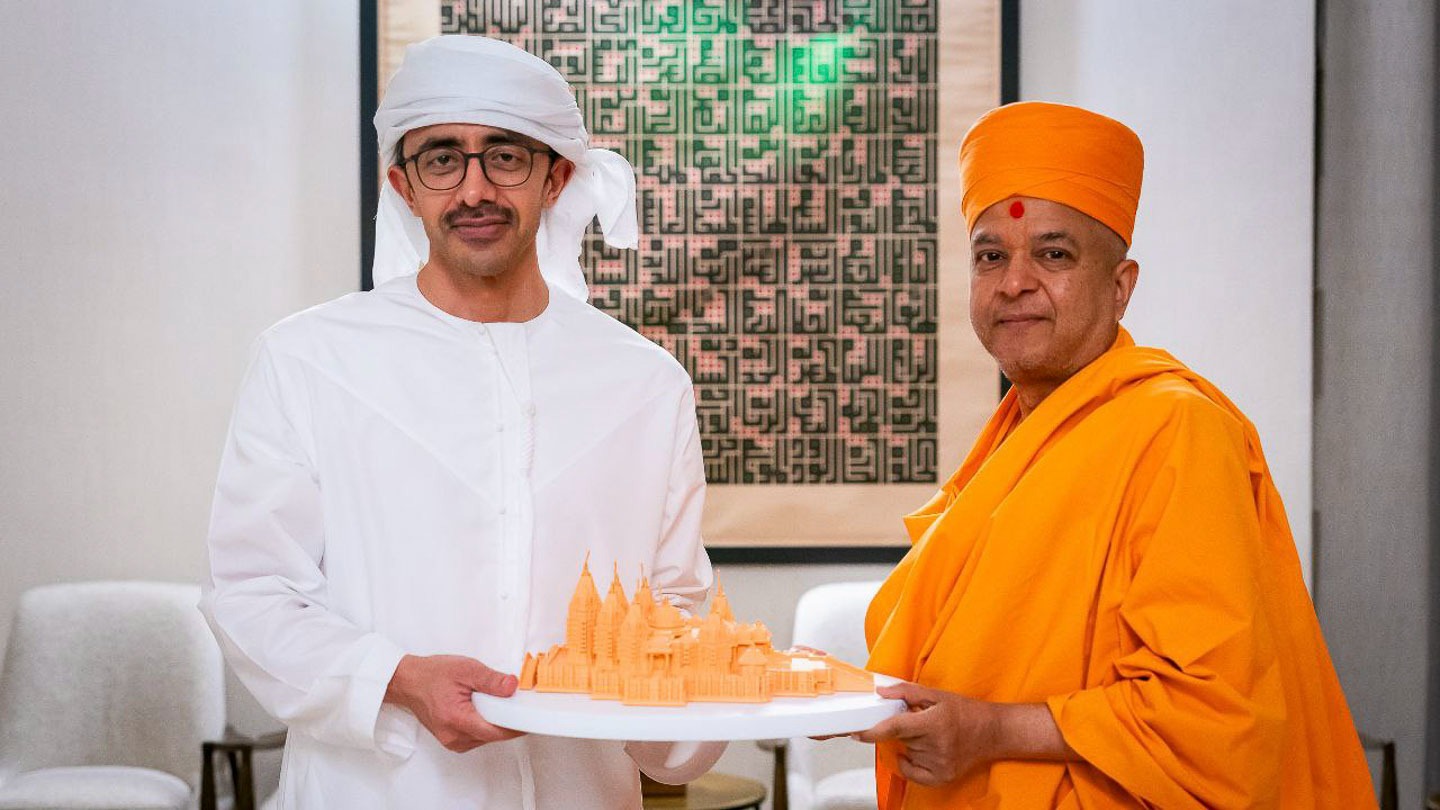UAE Traditions Embody a Peaceful and Pluralistic Society
The BAPS Hindu Temple in Abu Dhabi is all set to be inaugurated by Prime Minister of India Narendra Modi on February 14, 2024. Built over 27 acres of land gifted by the Government of the United Arab Emirates, the first stone temple in the region is constructed with pink stones from Rajasthan and boasts pillars made of white marble from Italy. In today’s world, where people of different beliefs and cultures are more connected than ever, this endeavour has reiterated the long-standing traditions shared by the UAE and India. These traditions of upholding diversity and respecting cultures and beliefs have made these nations the front-runners in promoting the vision of harmonious coexistence.
Creating a tolerant society requires a joint effort from religious institutions, leaders, and principles to tackle global issues, encourage dialogue between different faiths, and set aside resources in educational and cultural exchange programs to promote shared values. Only a collective effort from scholars, religious leaders, and policymakers from around the globe can push this peacebuilding agenda forward. In this context, the imperative for nations like the United Arab Emirates and India is to foster greater support and advocacy for religious pluralism.
Despite the differences in demographics, history, and political systems, the two countries are intertwined by their shared approach to supporting the cause of harmony and peace. Firstly, promoting religious pluralism aligns with the fundamental values of the UAE and India. When we read about the visionary founders of the UAE, we realise that they envisioned their nation to be built on the principles of tolerance, inclusivity, and religious pluralism, which is also a moral obligation rooted in the teachings of Islam. In the 1970s, during the rule of the late Sheikh Zayed, three churches were constructed in Abu Dhabi to accommodate different Christian denominations. It is also worth noting that in 1958, the late Sheikh Rashid bin Saeed al Maktoum, the former ruler of Dubai, authorised the construction of a Hindu temple in Dubai. This temple, featuring a Shiva and Krishna mandir, served as a place of worship for the Hindus residing in the UAE. Similarly, in India, a country known for its cultural diversity and tradition of religious tolerance, embracing everyone is embedded in its very soul, emphasising the importance of respecting and accommodating diverse religious beliefs.

Discord in society has a colossal impact on any nation’s economic, societal and intellectual growth.
Religious pluralism is essential for maintaining social cohesion and stability within both countries. In the UAE, which boasts a multicultural society comprising expatriates from over 200 nationalities, fostering an environment of religious tolerance is crucial for ensuring a sustainable future for all communities. Similarly, with its vast array of religious groups, promoting religious pluralism is vital for economic and social development in India.
Committing to religious pluralism enhances bilateral relations and global peace and stability. Moreover, advocating for religious pluralism strengthens the UAE and India’s international standing as beacons of tolerance and understanding. We are entering the Fourth Industrial Revolution; according to the World Economic Forum, the Fourth Industrial Revolution represents a fundamental change in how we live, work and relate to one another. And if history has taught us anything, we must know that religious pluralism has only strengthened societies. Fostering harmony catalyses economic development and prosperity, and advocating for religious pluralism has become a moral imperative. By standing up for religious pluralism, the UAE and India can send a strong message to many about the importance of embracing diversity and pluralism in all its forms.
Sustained effort can produce sustained results. The foundation of a sustainable future rests on faith being a unifying factor. Every religion preaches harmony, which is why religion becomes a common denominator for global peace. Today, most conflicts worldwide are triggered due to the misinterpretation of religion or politicisation of religion. Discord in society has a colossal impact on any nation’s economic, societal and intellectual growth. Religion is not divisive; it allows diversity to thrive because it teaches tolerance. Misinterpretation of religion, on the other hand, is the maleficence that destroys everything on its path and gives rise to hatred. It is time that this approach is made a part of mainstream diplomacy so that it can contribute to mending the global state of affairs.
The growing importance of religious diplomacy in today’s world cannot be overstated. As conflicts fuelled by religious tensions continue to plague various regions, the need for dialogue, understanding, and reconciliation has never been greater. India and UAE’s partnership exemplifies transformative power in fostering global peace, harmony, and coexistence. In conclusion, the United Arab Emirates and India have much to gain from supporting and advocating religious pluralism. By promoting tolerance, fostering social cohesion, enhancing their international standing, driving economic development, and upholding moral principles, both countries can build a more inclusive, peaceful, and prosperous world for future generations.
